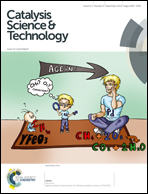Effect of yttria in Pt/TiO2 on sulfur resistance diesel oxidation catalysts: enhancement of low-temperature activity and stability†
Abstract
Compared to Pt/TiO2, yttria-doped Pt/TiO2 (Pt/TiO2–YOx) was found to efficiently improve the activity and stability as well as maintain the naturally excellent sulfur resistance of TiO2-based catalysts. The catalysts were prepared by using co-precipitation and impregnation methods, sequentially. The as-prepared catalysts were characterized by X-ray diffraction (XRD), scanning electron microscopy (SEM), N2 adsorption–desorption, X-ray photoelectron spectroscopy (XPS), and transmission electron microscopy (TEM). For Pt/TiO2–YOx catalysts, TEM images show that ultrafine platinum nanoparticles (<1 nm) with a narrow size distribution (0.31–1.29 nm) were dispersed on TiO2–YOx supports and XRD measurements confirm that yttria addition could lead to suppression of the anatase crystal growth and phase transition which could consequently enhance the platinum dispersion. SEM and nitrogen adsorption–desorption results further demonstrate that the presence of yttria could stabilize the porous structure and enlarge the specific surface area of TiO2. Hence, this work shows that yttria can act as a dispersion promoter and a structure stabilizer, which is beneficial to low-temperature DOC activity and stability.


 Please wait while we load your content...
Please wait while we load your content...